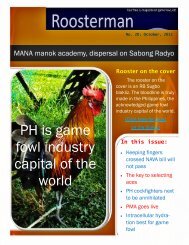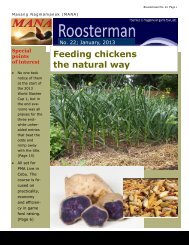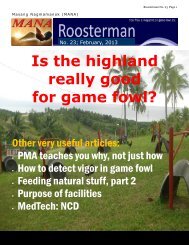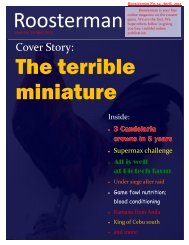Roosterman No. 11
Roosterman No. 11
Roosterman No. 11
- No tags were found...
Create successful ePaper yourself
Turn your PDF publications into a flip-book with our unique Google optimized e-Paper software.
Roostertech:All about chicken technology<strong>Roosterman</strong> <strong>No</strong>. <strong>11</strong>; January, 2012Antibiotics Compromise Chicken’s HealthInthe poultry industry, including inraising game fowl, antibiotics aremisused and over prescribed. <strong>No</strong>t only that millionsof hard earned pesos of ordinary chicken raisershave been wasted, the health of livestock and peoplehave also been compromised.Incorrect and indiscriminate recommendationof applying antibiotics led to development ofnew strains of harder to kill bacteria.The following recent article published in theNew York Times urges smarter and safer use of antibiotics.Antibiotics compromisechicken’s healthBy JANE E. BRODYAntibiotics are important drugs, perhaps themost important. In a world beset with “an unprecedentedwave of new and old infections,” as one expertrecently wrote, it is critically important thatantibiotics work well when people need them.But antibiotics are frequently misused —overprescribed or incorrectly taken by patients, andrecklessly fed to farm animals. As a result, lifesavingantibacterial drugs lose effectiveness fasterthan new ones are developed to replace them.Each year, 100,000 people in the UnitedStates die from hospital-acquired infections that areresistant to antibiotics, according to the InfectiousDiseases Society of America.These concerns led Dr. Zelalem Temesgen,an infectious disease specialist at the Mayo Clinic inRochester, Minn., to create a 15-part “Symposiumon Antimicrobial Therapy,” published in Februaryin The Mayo Clinic Proceedings. The series is intendedin part to help practicing physicians knowwhen and how antibiotics should be used — and,equally important, when they should not.Improving how antibiotics are prescribedcan do more than curb resistance. It can save livesand money by reducing adverse drug reactions andeliminating or shortening hospital stays, Dr.Temesgen said.The first installment in the series, based onguidelines developed by the infectious diseases societyand published with Dr. Temesgen’s introduction,was devoted to helping doctors practice bettermedicine. It also can help patients better understandhow and when antibiotics work best, and itcan arm them with the right questions when an antibioticprescription is being considered.28












